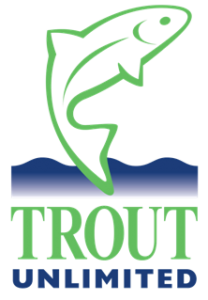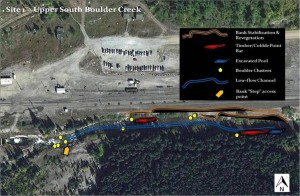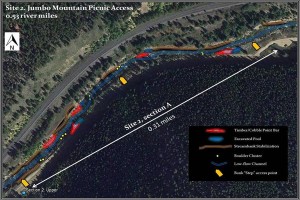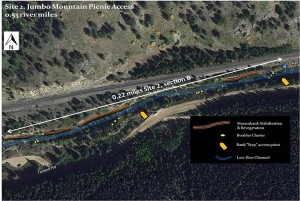Trout Unlimited and the U.S. Forest Service teaming up to restore our rivers!!
The U.S. Forest service along with residents, local governments, other agencies and many others have a long road ahead of them to restore what was damaged during the 2013 floods. To begin this process the U.S. Forest Service need to assess the damage of the rivers in order to develop a prescription for restoration across the entire watershed. They have turned to Trout Unlimited because we have an expansive network of dedicated volunteers that care about the watershed and want to make a difference. The Forest Service is hosting a training exclusively for Trout Unlimited members to learn how to assess the damage in the watershed based on the scientific protocol that they have developed. The surveys will take place in Northern Colorado along the Big Thompson, St. Vrain and Boulder Creek areas.
The training session will be on Tuesday evening, July 29, from 6:00 PM until 8:30 PM. It will take place at the Forest Service office building, 2150 Centre Ave. Bldg. E in Fort Collins.
We already have a large number of people signed up for this training but still have some space available for additional volunteers. If you attend this training you will be able to sign up for certain stretches of river to assess on your own time with a partner. If you CAN attend this training and are interested in being trained by the Forest Service to assess rivers then please let Stephanie Scott know ASAP!!
The remaining spaces are first come first serve, so if you want to attend this training I will fill the remaining spots in order of response.
To RSVP or for additional questions please contact Stephanie Scott sscott@tu.org or 720-354-2647
Bear Creek Cleanup in Evergreen
9am - Noon. Participants meet in the parking lot across from the Little Bear in downtown Evergreen and should bring waders and gloves. Children are welcome, but each child under 12 should be accompanied by an adult. For more information, prospective volunteers should contact me at ronbelak@msn.com.
West Denver Trout Unlimited Annual Stream Cleanup
September 27, 2014 @ 9am Congregate at the Mt. Tool and Feed Store (Mountain Gateway Mercantile) parking lot. Take exit 243 from I-70 (Central City Gateway Highway). The West Denver TU chuck wagon will be there.
Things to bring:
-- waders for crossing the stream or retrieve trash among rocks in the stream
bottom or stream bank .
-- gloves for your safety.
-- pinchers/grabbers to reach unreachable areas.
-- folding chair if you have one and would like to sit for lunch.
-- hat/cap – sunscreen
-- radios or cell phones for communication – there NOW is cell phone service.
-- water bottles – can be filled at the feed store.
Schedule:
*** juice & coffee & energy snacks at 9:00 – 10:00
*** sign waivers
*** pick up orange safety vests and orange trash bags
*** divide into groups/teams to work both sides of Clear Creek only if access is safe!!
10:00 - Teams will be driven to sites/pull-outs then picked up at the next pull out, either up or down stream. We will be working up stream from Mayhem Gulch toward the Feed Store parking lot.
CDOT is planning to have “Shoulder Work Ahead” signs along the area we will be “de-trashing” – hopefully the signs will cause the traffic to drive slower and help them become more alert.
Back to the chuck wagon as teams finish, to brag about the best find.
Lunch – 11:30 ish (provided). There is a fund raiser cook-out planned for the Feed Store customers so the grill will be ready any time you choose to eat.
Call Jackie for questions/concerns or to be added to the volunteer list.
Cell: 303-503-9356
Home: 303-278-2282 (leave a message if no answer)
e-mail: jorgedwards@aol.com
FRIENDS OF THE DILLON RANGER DISTRICT WATERSHED RESTORATION DAY
Volunteers are needed to help rehabilitate the watershed with natural vegetation. Projects will include burying logs for erosion control, collecting and planting willow shoots, transplanting native trees and grasses, as well as some spreading of native seed and hay to encourage regrowth. Please register online at FDRD.org
SCHEDULE: September 13, 2014 9am: Meet in parking lot - Introduction and overview of the day
12pm: Lunch
1pm: Arrive back at trailhead - wrap up discussion.
ITEMS TO BRING OR WEAR: Our summer mountain weather can range from sunny and warm to cold and wet. Be prepared.
- Work or hiking boots--no sandals or minimalist shoes
- Long pants, long sleeved shirt, other layers
- Rain gear, hat, sunglasses
- Sunscreen, insect repellant, allergy medications
- Day pack Lunch Snacks for munching on the trail Drinking water (AT LEAST 2 liters per person per day)
- Leather or heavy-duty work gloves (optional)
AGE REQUIREMENTS:
- Ages 6-15 must be accompanied by an adult.
- Ages 16-18 must have parental consent via FDRD waiver to attend.
REMINDERS
- Pets are not permitted
- Drink plenty of fluids before and during the project
- Smoking on the project site is not permitted
- Carpooling is highly encouraged
Moffat Agreement: What's In It for the River?
Earlier this year, after a long-standing dispute over Denver Water’s proposed Moffat Collection System Project (Moffat Project), Trout Unlimited, Grand County and Denver Water have reached an agreement on how to protect the Fraser River and its tributaries from the project’s impacts. Denver already diverts water - including an estimated 60 percent of the native flows of the Fraser - from the Fraser and Williams Fork basins through an extensive network of tunnels and pipes that funnel water to the Moffat Tunnel for delivery and use in the Front Range. Denver's proposed project would expand storage at Gross Reservoir and enable them to divert additional water from this network during comparatively wetter periods (generally spring and early summer, in wet and average years). The loss of these higher flow periods and the sediment flushing they provide, and the potential for summer diversions to exacerbate existing high stream temperatures, raise significant concern for TU and others concerned with the health of the Fraser basin. Above all, TU has been concerned that existing habitat models cannot properly predict impacts in a stream system that is already so depleted, and so we have consistently called for a monitoring and adaptive management program capable of detecting and addressing unanticipated impacts.
The agreement among Denver Water, Grand County, and TU responds to these concerns through an extensive package of enhancement and mitigation, guided by an ongoing monitoring and adaptive management effort called "Learning by Doing." Whether mitigation or enhancement, Denver Water commits to implement this package and that commitment would be included in the 404 permit for the project.
Learning by Doing (LBD) will be implemented by a committee that includes Grand County, Trout Unlimited, Denver Water, and Colorado Parks and Wildlife. The LBD Committee would implement an extensive monitoring program to assess stream health based on specific parameters including stream temperature, aquatic life, and riparian vegetation health. Water and financial resources committed by Denver Water (listed below) would be deployed to prevent declines and improve conditions where needed. Denver Water also commits to use flexibility in how it can operate its extensive water diversions system to help reduce impacts and where possible provide benefits to the streams. LBD would also be the vehicle through which mitigation measures imposed by the Corps would be implemented.The core concept is to dedicate substantial resources for mitigation and river enhancement, and then let future monitoring data help guide how to best apply those resources - so that river conservation efforts will be based on actual conditions, not on uncertain model results. And the program offers a path forward to not only address impacts from the proposed Moffat Project, but also to improve existing stream conditions.
So what are the resources Denver will provide to help the Fraser and Upper Colorado river basin? Here's a brief summary:
Mitigation Measures include: (1) Measures to address stream temperature issues:
- Monitor stream temperatures and bypass up to 250 AF of water annually if stream temperatures reach or exceed state standards
- Bypass sufficient additional flows to reach defined minimum flows if stream temperature problem persists after the 250 AF have been bypassed
- If temperature problems persist, contribute $1 million to LBD for additional projects to help reduce temperatures (such as riparian re-vegetation and channel improvements)
(2) Measures to address sediment/flyshing flow issues:
- Using flexibility in Denver's system operations, work to provide flushing flows as recommended under Grand County’s Stream Management Plan
- Operate and maintain sediment pond that catches highway traction sand
- If sediment problems persist, contribute $1 million to LBD for additional projects to help reduce sedimentation (such as channel improvements to facilitate sediment flushing)
(3) $750,000 for fish habitat restoration projects
(4) $72,500 for fish barrier and restoration of cutthroat habitat, plus any additional measures required by the US Fish and Wildlife Service in its Biological Opinion
Enhancement Measures include:
(1) Through LBD, implement an extensive monitoring program including stream temperature, sediment transport, benthic macroinvertebrates, and riparian areas and wetlands
(2) 1000 AF of water each year released from Denver Water’s Fraser collection system for the benefit of Fraser basin streams (guided by LBD and presumably during key low-flow periods)
(3) 1000AF of water each year released from Williams Fork reservoir (including up to 2,500AF of storage) for the benefit of the Colorado River below its confluence with Williams Fork
(4) Use Denver Water’s system operation flexibility (ie, retiming/reoperating their diversions) to address identified problems while maintaining water yield
(5) $3.75 million for aquatic habitat improvement projects ($1.25 million available before the Gross enlargement is built)
(6) $1 million to pump water at Windy Gap to Granby for release for the benefit of the Colorado River below Granby and below Windy Gap Reservoir
(7) $2 million for stream improvement projects in the Colorado River
(8) $1 million for the Colorado River Wild and Scenic Stakeholder effort in the Colorado River
(9) $2 million for water quality projects (available before the project is built)
(10) Provide in-kind contributions of people, equipment and material to benefit LBD
These are significant resources to benefit river and watershed health, especially as they will be applied based on a data-driven monitoring and adaptive management program in which multiple stakeholders, including TU, have a full voice. If for any reason LBD were to cease functioning, Denver Water commits to continuing to implement these measures through an alternative process that would be approved by the Army Corps of Engineers. To guarantee the enforceability of these commitments, Denver Water has asked that they be included as a term and condition of its Clean Water Act 404 permit for the Moffat Project. Inclusion of this “fail-safe” permit condition is critical to the agreement. Without it, Trout Unlimited cannot support either the agreement or the Moffat Project.
Trout Unlimited has fought long and hard to protect the Fraser River basin streams. The new agreement not only provides the tools needed to protect and even improve stream conditions, but it also puts Trout Unlimited in a position to influence their future. With that opportunity, we recognize an ongoing responsibility as well. Reaching this agreement (and next, ensuring its inclusion in the Moffat Project's permits) is a major milestone, but only the beginning for the real work ahead of saving the Fraser.
Boulder Fly Casters Work to Restore Boulder Creek
Trout Unlimited chapters throughout Colorado are dedicated to working on the conservation of habitat in their area. Boulder Fly Casters has been working tirelessly with several conservation projects, including one to restore the Upper South Boulder Creek. At two areas, Boulder Fly Casters are helping restore the creek at two separate areas: the Moffat Tunnel and the Jumbo Mountain Picnic Area. At both of these areas, at times of low flow, <10 CFS to >1000 CFS (Cubic Feet per Second), fish passages were blocked and the river offered very few holding areas.
According to Tim D’Avis, project supervisor and Boulder Fly Casters Board of Directors member, “The original stream wandered through the valley in the Moffat Tunnel area. With the advent of the water tunnel and railroad tunnel, the stream channel was routed next to the mountains on the south side of the valley. In the Jumbo Mountain area, the stream was pinched between the road and the railroad.”
In the spring of 2013, the restoration projects began. Efforts were soon made to build more bends in the stream to allow for more water flow. Along with more added structure, these bends will, according to D’Avis, address “the need to get water efficiently to Gross Reservoir.” The images below show the restoration sites and what is being done at each of those sites.
The Fishing is Fun Grant for $80,000 along with the Denver Water Board providing $124,900 made the restoration efforts possible. The United States Forest Service also donated roughly $10,000 worth of seeds which were scattered along the river banks. Along with the seeds planted, 700 willows were staked as well.
As of July 2014, restoration is about 95% complete according to the Boulder Fly Casting website.
Boulder Fly Casters is also working on several other projects including flood restoration , restoring Middle Boulder Creek at Rogers Park, and restoring part of Jenny Creek.
For more information, on the Boulder Creek project or any other projects Boulder Fly Casters is currently involved in, click on the links above, or check out their website at BoulderFlyCasters.org and click under the “Conservation” tab.
Glenwood Springs River Commission River Cleanup
The Glenwood Springs River Commission's River Cleanup and Community Barbecue! Volunteers are needed to pick up trash along the Roaring Fork and Colorado Rivers in Glenwood Springs and Glenwood Canyon. Volunteers will work from shore and from boats. Boaters are urged to participate. After the cleanup, volunteers will be treated to a barbecue and picnic with food donated by local restaurants. 9am - 2pm Directions: Two Rivers Park is the location for volunteers to check in and receive assignments. The midday barbecue for volunteers will also be at Two Rivers Park. Walk or ride your bike. Parking is limited. - Across from Centennial Drive on Devereux Road Glenwood Springs, CO 81601
See more at: http://web.glenwoodchamber.com/events/eventdetail.aspx?EventID=5083#sthash.ODjpvwt9.dpuf
Help needed at Big Thompson Wildlife Area
Big Thompson Wildlife Area - Lend A Hand DayWhen: Saturday, July 19th Volunteer Project Time: 7:30 a.m. - 1:00 p.m. with lunch provided at noon Number of Volunteers Expected: 100
Project Description: Big Thompson, fondly know as Big T has been significantly damaged from the flood in the fall of 2013. Volunteers will help remove fence, clean up a lot of debris, and help to scatter seed and plant willows to help restore some of the damage. Volunteers will be encouraged to car pool as parking is limited. Amenities will be primitive. Check out this link for more information on Big Thompson: http://cpw.state.co.us/swa/Big%20Thompson%20Ponds%20SWA
Ways to get involved: • Volunteer with the project or serve as a group lead • Help with volunteer registration or lunch set up and clean up • Donate money, tools, expertise or resources towards project
*Will give some career type demonstrations or talks geared towards younger volunteers over lunch and via group leads. SIGN UP: If you are interested in getting involved or volunteering for either of these projects please contact Vicki Leigh at vicki.leigh@state.co.us or at 303-291-7299.
Trout Unlimited Rolls Out TroutBlitz
As part of Trout Unlimited’s mission to conserve, protect and restore North America's coldwater fisheries and their watersheds, Trout Unlimited is now featuring TroutBlitz. TroutBlitz is a program that allows anglers all over, both members and non-TU members, to contribute to the protection and conservation of trout and their habitats.
TroutBlitz is an online program that allows anglers to picture and document the fish they caught to help TU scientists understand the populations of trout and the quality of the  watersheds across North America. By using a simple TroutBlitz website interface, all anglers, not just Trout Unlimited members can upload pictures of their fish and document the location where they caught it.
watersheds across North America. By using a simple TroutBlitz website interface, all anglers, not just Trout Unlimited members can upload pictures of their fish and document the location where they caught it.
The program was initiated to help organize a catalog and map healthy populations of wild and native trout. By sharing their information, “anglers can help us identify healthy populations of native trout and help us understand where non-native trout have been introduced over the years,” said TU senior scientist, Jack Williams in a Trout Unlimited press release.
Documenting the fish an angler catches, not only helps the TU scientists understand the populations of trout, it gives a better understanding of the watersheds and habitats across North America. According to the TU press release, “they [anglers] can help the organization [Trout Unlimited] identify intact watersheds, important tracts of intact habitat and waters that could benefit from restoration work, reconnection efforts or even native fish reintroduction efforts.”
Along with native and non-native trout, the feature will also help anglers and TU know where there are pockets of rare native fish, including bull trout and grayling.
To get involved, all you need to do is go fishing. Take your camera (or smart phone) with you to document your catch, along with a GPS device or map that will help determine where the catch was made, (some cameras or smart phones can track the GPS for you). After that, all you need to do is catch a fish then upload it to the TroutBlitz interface by clicking “add observations” on the TroutBlitz website.
TroutBlitz is offered through iNaturalist.org so to begin uploading catches you must sign up for an iNaturalist account for free. From there you can help TU and other scientists understand more about native and non-native trout all across North America. For more information on how to upload your photos and document your fish, visit Trout Unlimited’s TroutBlitz webpage.
As an incentive for anglers to share their catch, TU is offering prizes for the top posters. Prizes include some TU merchandise and apparel, a free TU membership, and chances to win prizes provided by sponsors.
For more information on the program, check out the Trout Unlimited press release regarding TroutBlitz.










